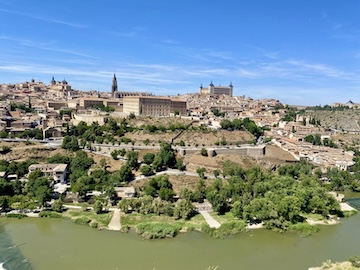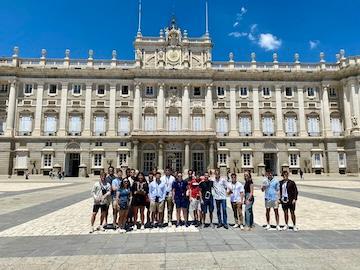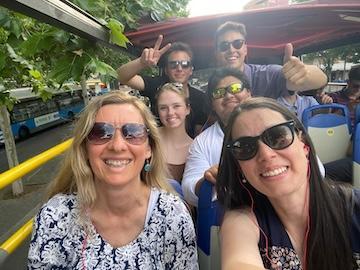Study Abroad: A Spanish Summer for VMI Cadets

LEXINGTON, Va. July 17, 2024 — Trips to Barcelona, Granada, Madrid, and more were just the perks for a group of Virginia Military Institute cadets this summer.
Nearly two dozen traveled to Spain this summer for a study abroad program, with varying majors and minors represented, from economics and business, modern languages, history, computer science, engineering, and more. 
The five-week program allowed cadets to take three classes at the Universidad de Alcalá in Alcalá de Henares near Madrid. They were enrolled in two Spanish classes taught by the university professors and an economics elective class, which was taught by VMI’s Col. Valentina Dimitrova-Grajzl, professor of economics and business.
“Study abroad programs are important because they humanize the rest of the world and introduce the students to new ideas and different ways of living, working, and interacting,” she said. “In a world of so much polarization, such programs can be a bridge for better understanding and cooperation.”
Dimitrova-Grajzl said cadets are able to develop an open-mindedness about the world by participating in study abroad programs like this one. She said it was rewarding to see how each cadet’s knowledge and worldviews were expanding and changing organically.
“Students experienced how the definition of economic and social well-being can differ across countries and cultures, how the architecture and design of cities can incentivize people to be active and socially integrated, and how the structure of a workday varies based on geography and climate,” she said.
The program was put together by Dr. Sabrina Laroussi, associate professor of Spanish in the Department of Modern Languages and Cultures, who has led the program for the past six sessions. Laroussi said she gets immense satisfaction seeing her students’ Spanish language skills progress.
"Every student has his or her own strategies to overcome language barriers as they go from being shy to order food in a restaurant or a coffee shop, or purchase something in a store, to making every effort to speak some of the local language to get around, connect with locals, and make friends,” she said. “Even if it is through using plain language or basic Spanish phrases such as ‘Hola’ (hello), ‘Gracias’ (thank you), ‘Un café con hielo, por favor’ (iced coffee, please).”
Firsthand experience and gaining credits
Connor Franklin ’26 decided to sign up for the Spain study abroad program because he and a friend both needed six more credit hours of Spanish language, plus it was his first time traveling to Europe for school. The economics and business major said the classes were very laid back but interactive. He was able to meander between classes, check out cafes, and enjoy the culture.
 “The experience was awesome; it was the most fun I have had. I learned so much about the culture of Spain and a lot about the European Union,” he said. “It was very interesting to see how people operated throughout their day and also to see how different their priorities were from people from the U.S.”
“The experience was awesome; it was the most fun I have had. I learned so much about the culture of Spain and a lot about the European Union,” he said. “It was very interesting to see how people operated throughout their day and also to see how different their priorities were from people from the U.S.”
Franklin said surrounding himself in the Spanish culture gave him a different way to learn the language.
“You are surrounded by the language, so you are forced to learn it. To me it is one of the best ways to learn a language,” he said.
This program allowed Cadlee Jarvis ’26, a history major, to travel abroad for the first time. Taking classes in a foreign country did take some adjusting, he said, especially compared to the structure that VMI has.
“I think this program is important to have at VMI because it gives cadets the opportunity to travel abroad and learn new information about different cultures,” he said. “It also helps cadets gain new experiences and memories that will last a lifetime.”
In addition to class time, cadets took trips to Southern Spain (Granada and Sevilla), to Northern Spain (Barcelona), and several day or half-day trips to Madrid to the U.S. Embassy, the Royal Palace, the Prado Museum, and several tours of the city.
Laroussi said she enjoyed seeing everyone embrace new experiences and step out of their culinary comfort zones.
"When we visit very touristy cities such as Seville, Barcelona, or Toledo, I always emphasize to students to avoid tourist traps: restaurants on big, popular squares or near major tourist attractions, or restaurants with a menu featuring multiple languages,” she said. “So, at the end of the day, when they tell me that they went to a restaurant where there were only locals, the waiters did not speak English, the menu was entirely in Spanish, and they ordered a local specialty... that is my greatest satisfaction.”
The students lived in a dorm at the Universidad de Alcalá along with Spanish students and other international students who were taking summer classes in Alcalá. They got to practice their Spanish language regularly since it is a town that is less touristy and provides a very authentic experience of living in a Spanish town.
Suzanne J.P. Leaptrot ’25, an English major, decided on the study abroad program so she could lighten her course load in her final year at VMI. This is her second study abroad opportunity. In the spring of 2023, she did a semester at Oxford. Spending a month in Spain, taking three classes was also the most cost-effective opportunity, she and others said. For nine credits, she only spent $5,400 on the classes, plus the flight to get to Spain. 
“Part of what makes this trip so valuable is the weekend trips we took. One thing I kicked myself for when I was in England was not traveling more and seeing the major England things. This trip took all the planning and energy out of my hands and took me to the major Spanish sites, and I’m so glad it did,” she said. “Alone, I never would have gone to the Picasso Museum in Barcelona, which was my favorite of all the places we visited.”
Thanks to taking an immersive language class, Leaptrot was forced to figure out ways to describe things when the vocabulary in the other language is limited.
"For example, toward the end of my trip, I was looking for Post-it notes at a grocery store and I did not know the word, so I asked a worker if they had sticky papers to take notes in books, the worker understood and told me where to go to find them. Three hours a week in a classroom just does not compare to an immersion class,” she said.
Colton Jones ’26, an international studies and political science major with a minor in national security, was intrigued by the program after seeing posters about it around post. A driving factor in going was so he could knock out his Spanish requirements, while being able to apply what he’s learning in real-time situations.
“It gives cadets a chance to really focus on their Spanish studies in a way that are unable to when they are at VMI,” he said. “They also get to experience a different culture and it may open their eyes to new experiences and new things that they otherwise never would have seen.”
Laura Peters Shapiro
Photos courtesy of Col. Valentina Dimitrova-Grajzl and Dr. Sabrina Laroussi
Communications & Marketing
VIRGINIA MILITARY INSTITUTE
.svg)
.png)